Wilas and Rusalki - The Mythical Beings Of The Slavic Mythology
Hello Fellow Steeminas , Today I would like to continue the journey and to tell you about these Mythical and mystical beings of the Slavic Mythology. Wilas and Ruslake. In my previous post I wrote about Alkonost And Gamayun the maiden birds of the Slavic Mythology feel free to check it.
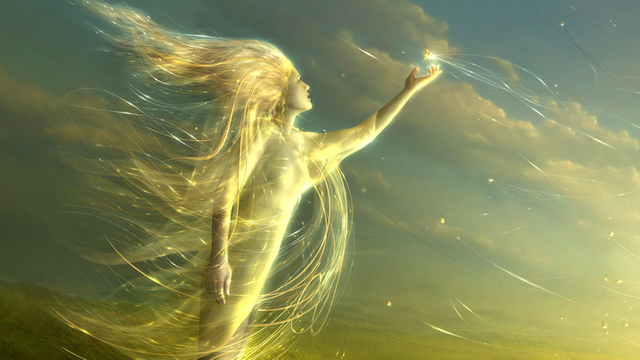
Wila is a mythical being of the Slovenian mythology. They inhabited in the forests or by the rivers, in the mountains and some of them they build their castles in the sky among the clouds.They were described as a very beautiful woman with a long hair that covers their lower back and chest. Some of them have blue, red and golden hair. It was believed that the Wila's strength lies in her hair. Wila has the power to control and to manipulate the wind, and usually, they appeared as a ghost and they could blend into the wind with an intangible form. They have the ability to manifest and have a physical body, in addition, they could take the form of animals such as horses, hawks, and swans. Some people believed that Wila was born from roses , others believe that she was born the same way as a human child , and later on she has to pass the initiation ceremony in order to become a Wila , by taking an oath that was given to her by the Wila godmother and her power will be passed to her after the initiation ceremony. They are considered as fierce warriors with a powerful voice as they can manipulate the wind, so they can form a violent storm that can destroy their enemies. The legend says that they used to trick and lure young men to dance with them until they meet their doomed fate, simply as a source of enjoyment leaving behind a ring of grass where they used to dance. Passing through this ring brings bad luck and demise.

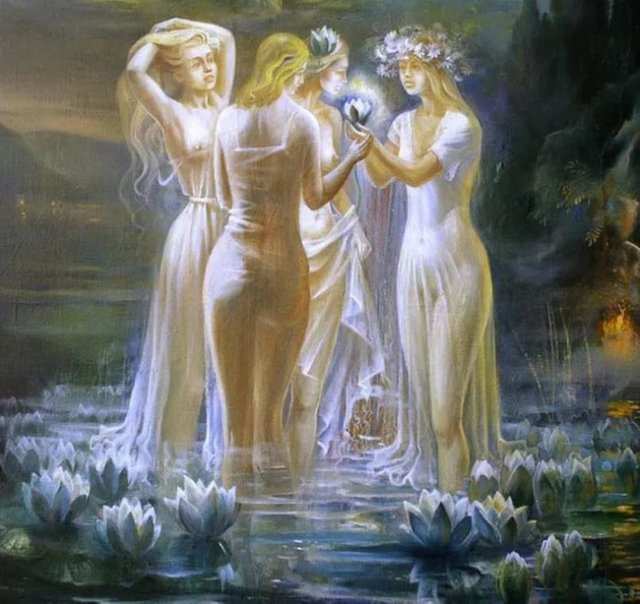
In Serbian folklore it was believed that Wilas possessed a healing magical power. In a time of war, they used to heal the injured, and they have the ability to foretell the future as they warn the heroes and soldiers of their doomed fate. They had the ability to speak with animals. On the other hand, if their dancing ritual was interrupted they would without hesitation kill the intruder. According to the legends in order to gain control over a Wila , a man should grab the Wila from her hair but that might leads to her death or she will transform her self to a solid physical shape and eventually will be captured. In other stories, if a man can get a piece of her skin he will be the Wila's master and she has to listen to him. Some believe that it was possible to transfer the Wila's power to mortals by breastfeeding a child, and they believed that child will be a great hero and will possess a supernatural powers.

Wilas in the Serbian Folklore
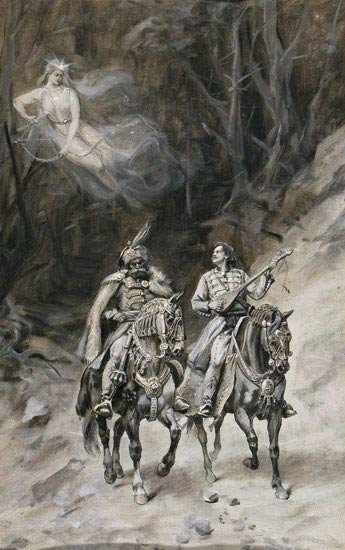
According to the Serbian mythology Wilas were described as beautiful women with beautiful long hair and they float up in the air shooting down arrows at men who dared to intervene with their rituals. In the Serbian language, there is an expression saying "ustrielila ga vila" which means the Wila has shot him with her arrow. They were given many names such as Janja, Jelka, Andresila, Jerisavlja, but the most famous name is Ravijojla which is connected to the prince Marko Mrnjavčević. The Prince Marko Kraljević is considered as one of the greatest mythical heroes in Serbian folklore, his name was mentioned in the ballad of Marko Kraljević and the Wila "Ravijojla". He was considered as a hero who fought against the Turks in order to achieve justice and to protect the weak riding his legendary horse Sarac.

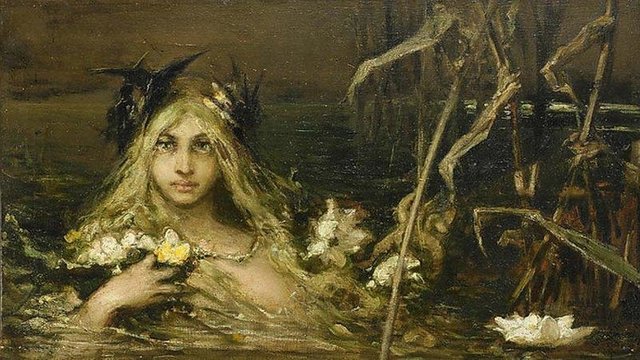)
The origin of Rusalka
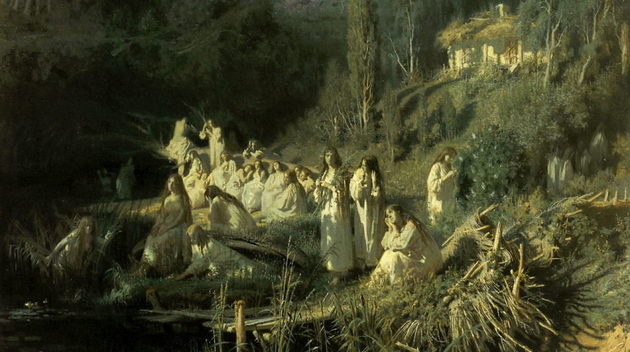
It can be dated back to the Slavic pagan tradition where young women were considered as a symbol of fertility and charming as they brought life to plants and helped the corps to grow as well in areas around the Danube river. Every spring as they came to the shore and they start their mystical ritual which includes dancing and chanting, but on the other hand, they were considered wicked, wild and evil as they brought misfortune and demised in harsher climates. They used to crawl out from the water in order to haunt and to ambush humans especially men in order to drag them down into the depth of water. There are quite a few stories in regard to the Origin of Rusalka. These stories revolve around women committing suicide by jumping into a lake or river and eventually drowning, because they were betrayed by their husbands or lovers and in other stories were told that if a woman was pregnant and carrying a child out of wedlock or a young woman who suffered from a violent death or who died as a virgin.
Rusalki Week
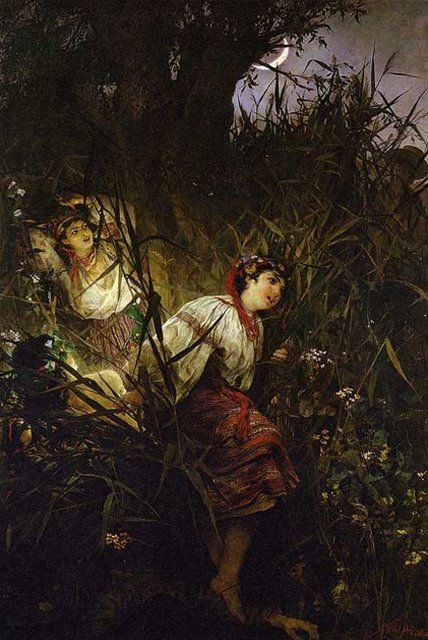
Rusalki poem
In lakeside leafy groves a friar Escaped the world; out there he passed His summer days in constant prayer, Deep studies and eternal fast. Already with a humble shovel The elder dug himself a grave, And calling saints to bless his hovel, Death—nothing other—did he crave. So once upon a falling night he Bowed down beside his drooping shack And meekly prayed to the Almighty. The grove was turning slowly black; Above the lake the mist was lifting; Through milky clouds across the sky A ruddy moon was softly drifting, When water drew the friar’s eye – He looks; his heart is full of trouble, Of fear he cannot quite explain; He sees the waves rise more than double And suddenly grow calm again. Then, white as first snow of the highlands, Light-footed as nocturnal shade, There comes ashore and sits in silence Upon the bank a naked maid. She looks at him and brushes gently The hair and water off her arms. He shakes with fear and looks intently At her seductive, luscious charms.With eager hand she waves and beckons, Nods quickly, smiling from afar, And shoots within two flashing seconds Into still water like a star. The glum old man slept not an instant All night. All day not once he prayed; Before his eyes still hung and glistened The wondrous girl’s persistent shade. The grove puts on the gown of nightfall; The moon walks on the cloudy floor; And there’s the maiden—young, delightful, Reclining on the spellbound shore. She looks at him, her hair she brushes, Smiles send him kisses sweet and wild, Plays with the waves—caresses, splashes – Now laughs, now whimpers like a child, Moans tenderly calls louder, louder… “Here, monk, here, monk! To me, to me!” Then vanishes in limpid water, And all is silent instantly… On the third day the ardent hermit Was sitting on the shore, in love, Awaiting the voluptuous mermaid, As shade was lying on the grove. Night ceded to the sun’s emergence; By then the monk had disappeared. It’s said a crowd of local urchins Saw floating there a wet gray beard.
This poem was written by Alexander Pushkin.


I always like to read your writing in mythology. Good job. keep it up :)
Thanks for the support cheers bro :)
Great job on being from Slavic mythology. Every forest has its own Wila, they differ in character variously. At least thats what old people say. Some wila's steal children, some play with animals. Themost famous Wilas are the one that play with the manes of horses
Thanks for your feedback :) i will do more digging to find out more
keep up the good work bro. :)
Thanks man :)
Congratulations @hadialhendi! You have completed the following achievement on the Steem blockchain and have been rewarded with new badge(s) :
Click here to view your Board of Honor
If you no longer want to receive notifications, reply to this comment with the word
STOPDo not miss the last post from @steemitboard:
Congratulations @hadialhendi! You received a personal award!
Click here to view your Board of Honor
Congratulations @hadialhendi! You received a personal award!
You can view your badges on your Steem Board and compare to others on the Steem Ranking
Vote for @Steemitboard as a witness to get one more award and increased upvotes!